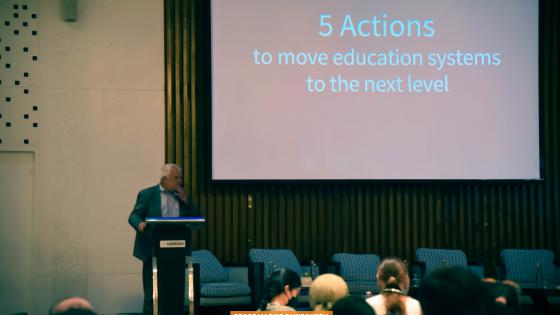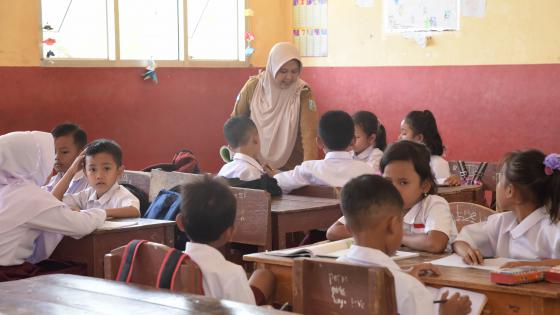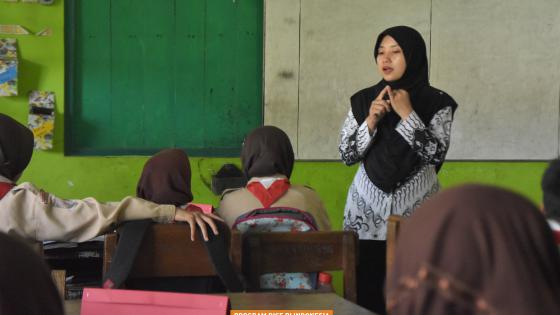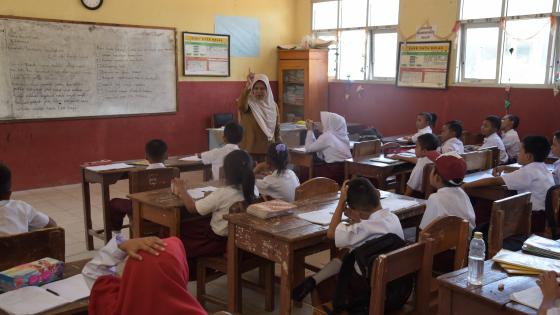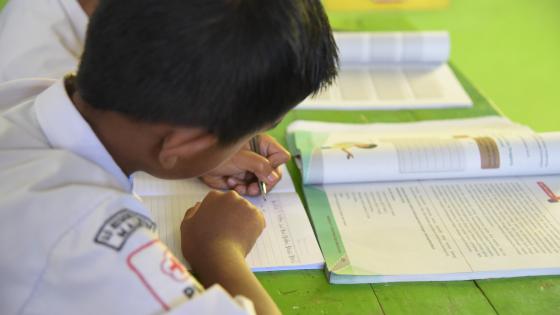Photo illustration: Novita Eka Syaputri
.
This article was originally posted on The Conversation Indonesia and has been translated by RISE team.
.
Indonesia is experiencing an education emergency.
The results of the Programme for International Student Assessment (PISA) in 2018 indicated that Indonesian students' reading scores were at their lowest since participating in PISA in 2000. Students with low basic mathematics competence (below Level 2 on the PISA scale) aggregated to 71.9%—ranked 7th the worst of 77 countries surveyed.
One of the root causes of the poor quality of education in Indonesia is the low quality of teachers. From 2012 to 2015, 1.3 million of the 1.6 million teachers who took the Teacher Competency Test (UKG), which measures competency in managing learning and understanding the subjects taught, did not even meet the minimum score.
Our qualitative study through the RISE Programme in Indonesia showed that a significant cause of the low quality of teachers is the teacher recruitment process which does not focus on selecting professional education personnel but rather on meeting the demands of the civil servants.
Of the approximately 2.9 million teachers in Indonesia, more than half (about 1.5 million) are civil servants.
Teachers who come from the government recruitment system are very crucial for the Indonesian education system because they are the foundation of learning for almost 90% of schools in Indonesia.
It is difficult to sort out teachers who do not have “passion” in teaching.
In education, the “calling” or passion is important to becoming an educator since it is closely related to their love of the knowledge taught to students and their enthusiasm to explore students’ potential.
However, the current teacher recruitment system has not been able to properly select educators who have high calling.
Government Regulation Number 74 of 2008 stipulates the teaching profession, particularly in public schools, as part of civil servants. This regulation leads to teachers’ dual roles: as educators and government employees.
This duality of roles makes it difficult to split applicants for the teaching profession who have an interest and motivation to teach from those who are simply interested in positions as government employees.
Disregarding the needs in the field
Last year, the Teachers Association of the Republic of Indonesia (PGRI) noted that Indonesia had a shortage of 1.1 million teachers. One of the indirect causes is the binding of teacher recruitment with the civil servant status.
The recruitment of civil servant teachers is based on the education budget allocation in the state budget, not on the needs for the number of teachers in schools.
This becomes a problem when civil servant recruitment experiences discontinuation, as has happened in recent years to reduce the number of new civil servant recruits.
Since the supply of educators ignores the needs in the field, schools can never cover the teacher shortage.
In the end, recruiting honorary or non-permanent teachers has been an alternative to facilitate the continuation of student learning.
However, when there is a large teacher shortage, the recruitment of honorary teachers tends to be organised in an informal and rushed manner, disregarding educational competence. As a result, the teachers recruited are often of low quality.
Disregarding the work skills of teachers
The teacher recruitment process as part of the civil servant recruitment process generally does not pay attention to the work skills required of a professional teacher.
The teaching profession requires complex work skills. Teachers must have the ability to teach effectively and high commitment and motivation to educate their students.
Meanwhile, teacher recruitment in the civil servant recruitment system generally prioritises nationalism and general knowledge and not teaching competence.
Prospective teachers with the highest scores on the basic competency selection will take part in a written selection that examines their learning management skills and knowledge of the subjects they teach.
In fact, there is no way of knowing the competence of a professional teacher through a written general knowledge test.
In the end, the recruitment of teachers in the civil servant recruitment process, in general, is unable to select the best prospective teachers.
What should be done?
The above-mentioned three problems—coupled with a system of financial incentives and rank based on years of service and not performance—have made this profession a scourge for many prospective teachers.
Many of them choose to teach in private schools. In fact, some graduates of the teacher education programme with good qualifications ultimately choose other professions.
To improve these conditions, we propose the following solutions:
First, the teaching profession should be treated as a professional job. This means that the teaching profession should be regulated as professionals who have responsibilities for the performance of the profession.This essence has been stipulated in Law Number 14 of 2005 on Teachers and Lecturers. The Law states that teachers from the Indonesian education system are expected to have “the calling”, “competence”, and “educational background according to the field of work”.
Second, this means that the teacher recruitment process should be separated from the general civil servant recruitment process.
To become a teacher with the status of a government employee, the teacher should undertake a probationary period, first with an honorary status, for instance. After a certain period, teachers who have gone through a probationary period with good performance can take part in the selection as civil servants, which is separate from the recruitment of civil servants in general.
In the current recruitment process, teachers who have passed the civil servant recruitment selection are accepted first as government employees and then undergo a probationary period. This stage often only serves as a formality.
Studies show that a teacher selection process involving a probationary period from the start can attract the best quality teachers who have the work skills as professional educators.
Such practice has been carried out in several countries, such as Australia and Ireland.
Third, the government should define teacher competency standards—consisting of pedagogical, professional, social, and personality competencies—in a more measurable manner with orientation to the quality of student learning.
Changes to the Law on Teachers and Lecturers should be made in order to encourage various parties, including the teacher colleges (LPTK) under the Ministry of Education and Culture, to better prepare prospective teachers who have the characteristics of effective teachers.
These major changes will definitely require processes involving various parties, including the central government, ministries, regional governments, as well as the parliament (DPR) and the regional parliament (DPRD). Not to mention, negotiations and political lobbying are needed that have the potential to hinder the process of recruiting professional teachers.
Nevertheless, improving teacher professionalism through effective recruitment is necessary today for a brighter future for Indonesian education.


